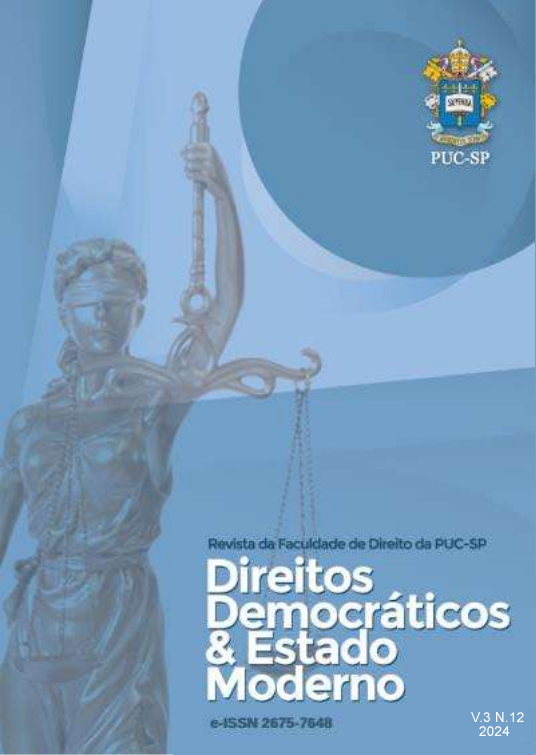The Fundamental right to disconnect in the context of remote work
challenges and perspectives in the digital age
DOI:
https://doi.org/10.23925/ddem.v.3.n.12.67444Keywords:
Right to disconnect, Remote work, Mental health, Labor legislation, Work-life balanceAbstract
The research investigates the phenomenon of the fundamental right to disconnect in the context of remote work, driven by the COVID-19 pandemic. The study, conducted through an integrative literature review, analyzes the reactions of companies and workers and the social and political consequences of implementing this right. The results indicate that disconnection is crucial for workers' well-being, highlighting the need for policies that protect mental health and work-life balance. International examples, such as France and Australia, demonstrate successful legislation ensuring periods of disconnection. In the USA, the lack of uniform federal legislation reflects the complexity of the governmental system. A multifaceted approach for the effective implementation of the right to disconnect is proposed, including the creation of federal legislation, development of clear internal policies, use of technological tools, promotion of a healthy organizational culture, continuous education and awareness programs, and psychosocial support services. It concludes that such measures are essential to ensure the benefits of remote work, avoiding the risks of constant connectivity.
References
ALEMANHA. The right to disconnect. 2017. Deutscher Gewerkschaftsbund. Disponível em: https://www.dgb.de/themen/++co++f0a30eb8-5f5b-11e7-9a5c-525400e5a74a. Acesso em: 23/07/2024.
ARENDT, Hannah. A condição humana. 10ª ed. Rio de Janeiro: Forense Universitária, 2001, 452p.
BRIZZI, Arthur; FELKER, Maitê Caurio; NASCIMENTO, Valéria Ribas do. Direito à desconexão na sociedade em rede: análise dos projetos de lei brasileiros à luz da Resolução do Parlamento Europeu. 2022. Disponível em: https://www.ufsm.br/app/uploads/sites/563/2022/11/1.2.pdf. Acesso em: 23/07/2024.
BAILEY, Diane E.; KURLAND, Nancy B. A review of telework research: Findings, new directions, and lessons for the study of modern work. Journal of Organizational Behavior, v. 23, n. 4, p. 383-400, 2002. Disponível em: https://onlinelibrary.wiley.com/doi/abs/10.1002/job.144. Acesso em: 23/07/2024.
BARUCH, Yehuda. Teleworking: Benefits and pitfalls as perceived by professionals and managers. New Technology, Work and Employment, v. 15, n. 1, p. 34-49, 2000. Disponível em: https://onlinelibrary.wiley.com/doi/abs/10.1111/1468-005X.00063. Acesso em: 23/07/2024.
BONDUKI, Maria Fernanda; SERAU JUNIOR, Marco Aurélio. O direito à desconexão e o teletrabalho no sistema jurídico brasileiro: Perspectivas de concretização. Revista Brasileira de Direito Social, v. 6, n. 2, p. 83-101, 2023. Disponível em: https://www.revistadireitosocial.com.br/artigo/direito-a-desconexao-e-teletrabalho. Acesso em: 23/07/2024.
CANADA. Employment Standards Act (ESA). Government of Ontario. Disponível em: https://www.ontario.ca/document/your-guide-employment-standards-act-0. Acesso em: 23/07/2024.
CHEHAB, Miguel Elias Mitti. Karoshi e a saúde do trabalhador: uma análise sobre a relação entre excesso de trabalho e a saúde mental. JusLaboris, 2023. Disponível em: https://juslaboris.tst.jus.br/bitstream/handle/20.500.12178/50030/008_chehab.pdf?sequence=1&isAllowed=y. Acesso em: 04/07/2024.
CHRIST, Ginger. In the US, companies may lead the ‘right to disconnect’ movement, leaders say. HR Dive. 18 de março de 2024. Disponível em: https://www.hrdive.com/news/us-companies-right-to-disconnect-movement/710600/#:~:text=Increasingly%20more%20nations%2C%20including%20France,and%20not%20face%20negative%20repercussions. Acesso em: 04/0//2024.
DRUCKER, Peter F. The new society of organizations. Harvard Business Review, v. 70, n. 5, p. 95-104, 1993. Disponível em: https://hbr.org/1992/09/the-new-society-of-organizations. Acesso em: 23/07/2024.
EDWARDS, Paul; WAJCMAN, Judy. The politics of working life. Oxford: Oxford University Press, 2005. Disponível em: https://global.oup.com/academic/product/the-politics-of-working-life-9780199271912. Acesso em: 23/07/2024.
EUROFOUND. Right to disconnect in the 27 EU Member States. 2020. Disponível em: https://www.eurofound.europa.eu/publications/report/2020/right-to-disconnect-in-the-27-eu-member-states. Acesso em: 23/07/2024.
EUROFOUND. Right to disconnect: Implementation and impact at company level. 2023. Disponível em: https://www.eurofound.europa.eu/en/publications/2023/right-disconnect-implementation-and-impact-company-level. Acesso em: 04/07/2024.
GIMÉNEZ-GUALDO, Ana M.; DIERKS, Arne; HERRERA-SÁNCHEZ, Inmaculada M.; MORENO-JIMÉNEZ, Bernardo. The right to disconnect: Exploring company practices. European Commission, 2021. Disponível em: https://www.eurofound.europa.eu/en/publications/2021/right-disconnect-exploring-company-practices. Acesso em: 23/07/2024.
HYDE, John. The right to disconnect: Potential amendments to the Canada Labour Code. 2024. Talent Canada. Disponível em: https://www.talentcanada.ca/the-right-to-disconnect-potential-amendments-to-the-canada-labour-code/#:~:text=In%20the%202024%20federal%20budget,right%20to%20disconnect%E2%80%9D%20for%20employees.&text=While%20the%20exact%20details%20of,between%20work%20and%20personal%20time. Acesso em: 23/07/2024.
INTERNATIONAL LABOUR ORGANIZATION (ILO). Telework during the COVID-19 pandemic and beyond: A practical guide. Geneva: ILO, 2021. Disponível em: https://digitallibrary.un.org/record/3878775?v=pdf. Acesso em: 23/07/2024.
JAPAN LABOUR LAW. Working Hours, Leaves & Vacations. 2023. Disponível em: https://japanofw.com/labour-working-hours-leaves-vacations/ Acesso em: 04 jul. 2024. Acesso em: 23/07/2024.
LANTYER, Victor Habib. Direito digital e inovação. Salvador: Editora Navida. 2023. Disponível em: https://www.amazon.com.br/Direito-Digital-Inova%C3%A7%C3%A3o-Victor-Lantyer-ebook/dp/B0C21B9DCL/ref=sr_1_2?dib=eyJ2IjoiMSJ9.8V9wqrD3zAyZBTaUZVwh_q1VyCgJnRusYJsZBl1jEFLX9y5IW4njE4v0a95E8dvGjmw3uEVbv6RMN7pYubgSdfkCLPyXEhaplKmhP_ybp0-i19ulIbAD9Gl40t_H5MWs_nUvi1kjViNPhnSzHoNB8BbGWT5QMgT8szwQhjCkuTwnojnKYgLHqkWhwG0kntoakq2anhjm1uFH8jdg37Wi53ccTJzc9KXlJbJK98EtwftoilWHNeNRbZgWpOMJQpl-xufKUsy68S5CdRtLAfu9w6h1uUqR3Tr5VPZO2192gmQ.SSueC1-3feBAQJCbCSToSE0_IP4ferKtmLlqazJ8G7M&dib_tag=se&keywords=direito+digital+e+inova%C3%A7%C3%A3o&qid=1720028369&sr=8-2. Acesso em: 23/07/2024.
MÉDICI, Alejandro. La Constitución Horizontal: teoria constitucional y giro decolonial. Centro de estúdios jurídicos y sociales Mispat, A.C., Facultad de Derecho de La Universidad Autónomo de San Luis Potosí; Educación para las Ciencias em Chiapas, 2012. 189 p.
MESSENGER, Jon C.; GSCHWIND, Lena. Three generations of telework: New ICTs and the (R)evolution from home office to virtual office. New Technology, Work and Employment, v. 31, n. 3, p. 195-208, 2016. Disponível em: https://onlinelibrary.wiley.com/doi/full/10.1111/ntwe.12073. Acesso em: 23/07/2024.
MHLW. Labor Standards Act. Disponível em: https://www.mhlw.go.jp/content/001199834.pdf. Acesso em: 04/07/2024.
NILLES, Jack M. Managing telework: Strategies for managing the virtual workforce. New York: Wiley, 1998. Disponível em: https://www.wiley.com/en-us/Managing+Telework%3A+Strategies+for+Managing+the+Virtual+Workforce-p-9780471161799. Acesso em: 23/07/2024.
NIPPON. Right to Disconnect: Most Japanese Employees Get Contacted Out of Hours. 2024. Disponível em: https://www.nippon.com/en/japan-data/h01869/ Acesso em: 04/07/2024.
ONO, Hiroshi. Japan must reform its inflexible work culture. East Asia Forum. 2022. Disponível em: https://eastasiaforum.org/2022/11/24/japan-must-reform-its-inflexible-work-culture/. Acesso em: 23/07/2024.
PORTUGAL. Lei n.º 93/2019. Lisboa: Imprensa Nacional-Casa da Moeda, 2019. Disponível em: https://dre.pt/pesquisa/-/search/124256698/details/maximized. Acesso em: 23/07/2024.
POST, Richard e SIEGEL, Reva. Constitucionalismo democrático: por una reconciliación entre Constitución y Pueblo. Buenos Aires, Siglo Veinteuno Editores, 2013.
TAMAJO, Stefano de Luca. The right to disconnect around the world. IusLaboris. 2024. Disponível em: https://iuslaboris.com/insights/laws-on-the-right-to-disconnect/ Acesso em: 23/07/2024.
Downloads
Published
How to Cite
Issue
Section
License
Copyright (c) 2024 Democratic Rights & Modern State

This work is licensed under a Creative Commons Attribution 4.0 International License.
This work is licensed under a License Creative Commons Atribuição 4.0 Internacional.
The authors grant the journal all copyrights relating to the published works. The concepts issued in signed articles are the absolute and exclusive responsibility of their authors.
DD&EM Magazine - ISSN 2675-7648

















